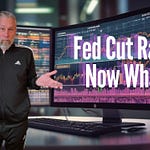The VIX — often called the “fear gauge” — is sitting near its lowest point in a year. History shows that when volatility gets this low, it often doesn’t stay there for long. Low VIX means complacency, and complacency can give way to sudden spikes when the market turns.
I’m seeing a few signals worth noting:
Divergence in SPY: Price is making new highs, but the RSI isn’t keeping pace. That’s a classic divergence — often a caution flag.
Volume Drop-Off: While SPY’s been climbing steadily since April, trading volume has been fading. Rising markets with falling volume sometimes hint at a slowdown.
VXX Pitfalls: Buying VXX (or calls on it) when VIX is low can be tricky because of time decay and natural price erosion. Patience is key — spikes can be an opportunity for puts instead.
Right now, portfolio “insurance” is cheap. Whether that means hedging positions or simply being more selective, the data suggests this might be the time to prepare rather than chase.
#VIX #SP500 #MarketVolatility #OptionsTrading
Options involve risk and are not suitable for all investors. Before trading options, please read Characteristics and Risks of Standardized Option (ODD) which can be obtained from your broker; by emailing investorservices@theocc.com; or from The Options Clearing Corporation, 125 S. Franklin St., Suite 1200, Chicago, IL 60606. The content posted by our authors is intended to be general education and / or general information in nature. We are NOT providing advice for any individual trader. No statement made by our authors or subscribers is intended to be a recommendation or solicitation to buy or sell any security or to provide trading or investment advice. Traders and investors considering options should consult a professional tax advisor as to how taxes may affect the outcome of contemplated options transactions. Futures and forex trading contains substantial risk and is not for every investor. An investor could potentially lose all or more than the initial investment. Risk capital is money that can be lost without jeopardizing one's financial security or lifestyle. Only risk capital should be used for trading and only those with sufficient risk capital should consider trading. Past performance is not necessarily indicative of future results.










